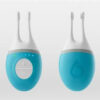Superstition vs Medicine
Do you avoid walking under a ladder? Have you a lucky shirt you wear to root for your favorite team? Toss a little salt over your shoulder after you spilled it? It’s superstition or “magical thinking” and we all do it, at least most of us do. Even when we know these tricks don’t work, we often feel compelled to use them. It’s a way of managing that which is out of our control of medicine.
How does this apply in medicine? Too often correlation — “I went out in the winter with wet hair” — gets confused with causation — “Wet hair outdoors in the winter gave me a cold.” Wet hair and cold air do not cause illness, just discomfort.
Believing What We Do Not Believe is the name of a paper published this month in The Journal of American Psychological Association, written by Jane L. Risen, associate professor of behavioral science and William Ladany Faculty Scholar at the University of Chicago. (The link above goes to an abstract of the article. A subscription is needed to access the complete article. Jane Risen was kind enough to send me the full copy to read.)
Our brains have 2 ways of making decisions, fast (intuitive) and slow (deliberate). Many times we rely just on the fast process, it’s often good enough. But, on second thought, our slower, more rational process kicks in and, if it detects an error will change the decision. That’s the core of a commonly used theory developed by psychologist Daniel Kahneman.
Those who persisted in believing knocking on wood could keep something bad from happening were categorized, in the prevailing theory, as either poorly educated, not very smart, trained by custom, driven by anxiety, desire, or some other irrational emotion. Risen points out this doesn’t explain why, as she says, “college students regularly engage in exam-related superstitions” or why an intelligent person might believe vaccines cause autism despite mounds of research proving they don’t.
Risen suggests that the slower, deliberate thought process can be derailed. Once an error is detected, Risen’s theory suggests correction is not guaranteed. Correcting an error is a third process and under certain circumstances the mind chooses not to correct, but will seek out reasons, real or imagined, to support the first decision — the gut reaction. Risen terms that “acquiescence.” See the diagram from Risen’s article:

What would lead people to acquiesce and stick with their first, gut belief even when presented with facts that contradict it?
Take, for example, the idea that the MMR vaccination can cause autism. While a large and significant body of research exists to disprove the notion, it persists. Risen proposes 3 factors that may lead to acquiescence of irrationality:
- Intuition provides a compelling default: “I can save my child from autism.”
- The costs of ignoring rationality are low relative to the costs of ignoring intuition: “None of my friends kids have ever gotten the measles, it probably won’t happen. But autism seems epidemic, my neighbor’s child has it.”
- People take an opportunity to rationalize their intuition — that is, if they can find reasons to put aside their knowledge of what is true in general to follow their intuition in a particular situation: Look at all the mom-blogs out there all saying vaccines cause autism, and Jenny McCarthy too! Big Pharma controls the research and we can’t trust them. I trust what I hear on the Internet.
Here’s a thoughtful blog about a mother’s decisions about vaccinations and autism. And please don’t miss our own Denise Schipani’s personal blog about her wonderful, and vaccinated, son.
This blog isn’t the place to lecture about the values of vaccinations and perils of forgoing them because this is not just about vaccinations and autism fears. I could just as easily have used antibiotics. We all fool ourselves into making the decision we prefer. It’s a wonderful outlet to be able to blame some outside action for what goes wrong or well in our lives. But in the end, we are better off acknowledging the reality of science and the role of chance. Yes, medical knowledge evolves and discoveries are made. And sometimes illnesses and challenges happen even if you do all you can to protect yourself and your children. But let’s let go of the old not for the sake of the new, but because it’s not serving us well.
When I enquired as to the reason for her injury the whole power of Friday the 13th was unleashed.
‘Well,’ she said, ‘I was walking along the pavement when I saw a ladder in front of me. Being Friday the thirteenth, doctor, I decided that I shouldn’t walk under the ladder so I stepped out into the road to avoid it — and a bicycle ran into me!’
–Doctor Colin Thomas, BBC News April 2001






